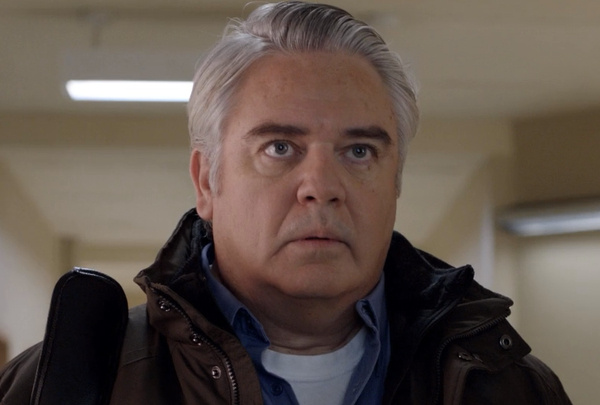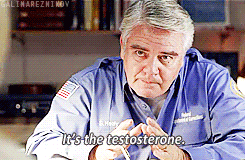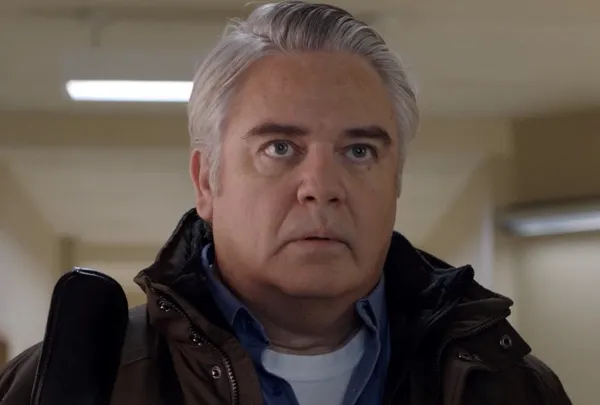
via Netflix/Little Things
Spoiler warning for all of Orange Is the New Black throughout.
Because Orange Is the New Black takes place in a women’s prison and is primarily concerned with the prisoners in said prison, the vast majority of its characters are going to be women. That’s not really a criticism, since there’s no real way around it. And despite the logic of that statement, one of the more irritating complaints I’ve heard about it is the idea that it lacks male representation.
Now, there are several ways one could answer this criticism. The first, and most obvious, is to dismiss it as the tiresome rants of an audience who cannot stand for any piece of media to not be aimed directly at them. One could also point out that, relative to its setting and premise, OItNB has plenty of male characters (Just as an extraordinarily rough example: Of the characters listed on Wikipedia as Main Characters, 3 are male, whereas of the characters listed as Main Characters in Oz, a show taking place in a men’s prison, only one is female).
But, as I watched the conclusion of season 4, I realized that I had a better dismissal than either of those. Because season 4 reveals that OItNB is more than capable of addressing and discussing specifically male issues. In fact, it has some excellent discussions of masculine insecurity and the “prison” of toxic masculinity. It manages this primarily through the character of Healy.
Actually, before I dive into OItNB, I want to make one thing clear. Most of this article is going to be devoted to discussing masculine identity and toxic masculinity, mostly in the context of how those things affect men. Now, these issues have been discussed quite a bit, even on this site, but usually in the context of how they affect women, queer folk, etc. And I don’t want to downplay, even for a moment, the importance of those questions. It is vital to ask those questions, and grapple with the answers.
But, and here comes the important part, I am not qualified to answer those questions. I’m white and I’m male (even if I’m not straight) so I’m not in the position to answer how toxic masculinity affects non-white and non-male people. But it is a fact that toxic masculinity and rigid male identity also negatively affect even the straightest, whitest man in the world, and that is a topic I am qualified to address…even if I am only going to address it in the context of Orange Is the New Black (if you want to go deeper into this topic, I’d suggest Dan Olson’s video series Man Media Movie Month or perhaps Ian Danskin’s Why Are You So Angry videos). Now, back to OItNB.
I’m not saying that Healy hasn’t evolved over the course of the series. Healy began the series as a semi-villain, but like the other season 1 antagonist, Pennsatucky, he eventually became a more fully rounded character. And in order to understand Healy, you have to understand how deeply entrenched his mind is in toxic masculinity.
Healy began the series (and continued for most of it) spouting some fairly generic sexist remarks, but as the series progresses, it becomes clear that these are not original ideas he has. A season 4 flashback shows his father drilling these ideas into his head, making sure he has an incredibly backward way of viewing women and their role in society. His father informs him, in no uncertain terms, that he should believe women are weaker, less intelligent and in need of his protection. It’s clearly something he’s deeply internalized.
That’s not a way of excusing his behavior (he still chooses to maintain these beliefs), but it does a good job of showing how this mindset traps and damages not only the women he has power over, but himself and his chances at having a meaningful relationship with a woman. Because for some reason, despite his father’s advice, his relationships keep falling apart.
His biggest relationship outside of work is with a Ukranian mail-order bride, which is strained from the moment we see it, and dissolves quickly and permanently off screen. The other guards and administrators don’t take him seriously, when they’re not openly mocking him, and the prisoners see him as easily manipulated or used for their own ends. Only Red seems to respect him, and his eventual attempts to reach out to her are rejected.
This is a direct result of his backward thinking. His interactions with women are a universal failure, as his lack of respect for them drips from every word. He is constantly reaching out to women in his life (Red, Piper, Suzanne, his wife, even his mother) but his inability to treat them them like human beings means that they are rejected or misunderstood. He has been so trained to think of women as lesser beings that he can’t untrain himself long enough to actually talk to one.

via Netflix/OITNB Wiki
He also has some very backwards ideas about mental illness (believing that lesbianism is a mental illness and, in turn, that having a mental illness is a sign of weakness or frailty), and when those two backwards ideas collide, his inability to communicate goes off the charts. In a flashback, he rejects his mother (who suffered from a mental illness) when she attempts to tell him she dislikes the electroshock therapy, causing her to leave. Later, when he’s an adult and encounters a homeless woman he believes to be his mother, and he can’t take her seriously enough to realize she actually isn’t until they’ve been talking for quite a while.
But the damage done to him from his toxic ideas about manliness aren’t just done to the women in his life, it’s also being done to him. He is clearly a lonely and unhappy person, desperate for some kind of connection with another person, but the notion that was drilled into him by his father (and by extension, society) to see mental illness as a form of weakness, as something to be mocked or despised, is preventing him from seeking help. In perhaps one of the greatest feats of irony of the series, Healy, who is supposed to be a counselor, is unable to seek counselling himself, and his growing unhappiness is allowed to fester.
This begins to come to a head in season 4, when Lolly and Healy cross paths. Lolly is a mentally ill prisoner, with what appears to be severe schizophrenia, who believes she killed, dismembered and buried a man in the prison. Healy, his mind hitting a cross section between his contempt towards women and towards mental illness, immediately dismisses her, telling her that she didn’t, and merely imagined it.
Only one problem: She did murder, dismember and bury a man in the prison garden (well, technically Alex was the one who killed him, but Lolly doesn’t know that). But Healy refuses to hear of it. His brain hits the intersection between his condescension towards women and his contempt for mental illness and he is functionally incapable of taking her seriously. What’s worse is that Lolly is so desperate for human contact, for someone to tell her that she’s okay, that she doesn’t pick up on his condescension and it becomes the closest thing to a genuine human connection either of them have had.
That Healy is borderline exploiting a woman with a mental illness in order to avoid altering how he treats women would already be kind of gross, but eventually becomes actively dangerous for everyone involved. When the body is eventually discovered in the garden, Healy immediately recognizes what he might have known weeks earlier if he’d given Lolly an ounce of respect: Lolly was telling the truth. His inability to take women seriously has resulted in real world consequences.
When he realizes this he…well, there’s no other word for it: he collapses. Healy leaves work, ignoring or dismissing phone calls from his superiors, eventually leaving a heartfelt message on his ex-wife’s phone and then walking into the lake to kill himself. The only thing that stops him from going through with it is when his phone rings and he thinks that, against the odds, he’s gotten through to someone. He hasn’t, it’s merely work demanding he come in again, but it’s enough. The thought that someone, anyone, anywhere needs him is enough to bring him back from the brink.
Healy’s story ends in the season finale with him checking into psychiatric care, which I feel is an important moment for his character: recognizing that he is in need of help, that his mindset is damaging him and the people around him and that he cannot deal with his depression alone. He has recognized, at least conceptually, that mental illness is not weakness. Someone at CTCon asked me where I think his story is going from here, but I’m not certain I want it to go anywhere. The simple act of him seeking help means that his story is over.
Healy’s story is a relatively minor one amongst the larger plot of the series, and even the big moments revealed in this season take a well deserved backseat to the larger storyline, and I undrstand why. Orange Is the New Black is a show about women, how they interact and how they are affected by their prison sentences, and given how rare that is in media, it should absolutely focus on that. And honestly, part of me wants to admonish myself for focusing on a man’s story amidst all the other, more worthwhile, stories being told.
But, Healy’s story is still an interesting one, worth telling and taking apart. It’s a story I can relate to, since I too know what it’s like to be depressed while having the world tell you that it’s weak or unmanly to feel that way. And even if I think the other stories in OItNB are more necessary right now, I still think that this background story could be engaging for the right people. We need more stories about depression on TV.
Or at least we did, until BoJack Horseman season 3 hit. I, mean you want to talk about depression…
Want more stories like this? Become a subscriber and support the site!
James is a Connecticut-based, Alaskan-born cinephile with an obsession with The Room and a god complex. His interests include Warhammer 40k, the films of Nicolas Cage (both good and bad), and obscure moments in history. He writes movie reviews for Moar Powah under the name Elessar and also has a blog, where he is reviewing every episode of The X-Files at I Want to Review. His twitter can be found at Elessar42, and his Tumblr can be found at FootballInTuxedos.
—The Mary Sue has a strict comment policy that forbids, but is not limited to, personal insults toward anyone, hate speech, and trolling.—
Follow The Mary Sue on Twitter, Facebook, Tumblr, Pinterest, & Google+.









Published: Aug 4, 2016 6:37 PM UTC